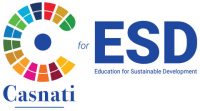What is Socio-Emotional Learning (SEL)?
The Collaborative for Academic, Social, and Emotional Learning (CASEL) updated its official definition of SEL in 2020.
Social and emotional learning (SEL) is an integral part of education and human development. SEL is the process through which all young people and adults acquire and apply the knowledge, skills, and attitudes to develop healthy identities, manage emotions and achieve personal and collective goals, feel and show empathy for others, establish and maintain supportive relationships, and make responsible and caring decisions.
SEL advances educational equity and excellence through authentic school-family-community partnerships to establish learning environments and experiences that feature trusting and collaborative relationships, rigorous and meaningful curriculum and instruction, and ongoing evaluation.
SEL can help address various forms of inequity and empower young people and adults to co-create thriving schools and contribute to safe, healthy, and just communities.
CASEL
In addition, UNESCO has developed its own frame to define the structure of SEL based on the most advanced neuroscientific research.
This frame is called EMC2 and identifies its four main components in
- Empathy
- Mindfulness
- Compassion
- Critical Inquiry
Why is SEL an important ESD principle?
In a complex system such as that of Sustainable Development, SDGs are both necessary goals to achieve and potential sources of emotional conflict, and experiences of dissonance.
For example, the eradication of poverty (SDG 1) could imply, at least in the short term, a need to compromise with individual desires.
Emotional resilience is the ability to virtuously manage positive and negative emotions that can overlap and allow the achievement of a healthy balance that keeps stress at bay. This process imposes the ability to self-regulate emotions that can be acquired through SEL.
SEL-DBT teachers’ training at Centro Studi Casnati
As from the school year 2022/23, the Centro Studi Casnati offers a training course for teachers engaged in Casnati for ESD activities, thanks to the support of the Psychologist and Psychotherapist Doctor Giovanni Davì.
The environment kids live in plays a fundamental role during the period of adolescence. A systematically disabling environment, in which the adolescent feels he has no right to feel a certain emotion and is judged negatively for this, can contribute to the onset of a potentially significant emotional dysregulation from a clinical point of view.
DBT Skills Training
Skills Training according to the model of Dialectical Behavior Therapy (DBT) is one of the most effective protocols recognized for the enhancement of specific skills that are decisive for an emotional regulation that can be functional
It is organized into four modules that focus on teaching and activating some fundamental skills to regulate and tolerate emotions, manage cognitive and behavioral disorganization, and improve interpersonal relationships.
Teachers’ role
Scientific literature has amply demonstrated how the prevention of emotional distress finds in the school context a fundamental environment for the development of protective factors.
Teachers can play a key role in creating an environment that validates as fully as possible the emotional state of adolescents, an environment that can allow children to give themselves the right to live their emotions in a functional way, decreasing the likelihood of dysfunctional compensatory behavior.
Teachers in their role as educators have an emotional and time-consuming closeness with children almost equal to that of the family and can concretely help adolescents to develop decision-making skills and functional emotion management skills/strategies.
The acquisition of specific skills included within the DBT Skills Training aims to promote adequate personal and professional skills that can support teachers in the delicate task they are called upon to perform on a daily basis.
General objective:
- to promote the recognition of the emotional distress of adolescents, in order to prevent and act in a timely manner on the same.
Specific objectives:
- increase the validation capacity, both of one’s emotional state and that of others;
- increase one’s own emotional culture (knowledge of emotions, strategies of emotional regulation);
- increase your sense of self-efficacy;
- reduce the likelihood of dysfunctional and impulsive behavior;
- improve relational skills, through greater use of assertive communication;
- increase the ability to tolerate and cope with potentially stressful situations;
- facilitate the timely reporting of critical situations in order to activate ad hoc interventions;
- increase teachers’ strategies to deal with the emotional distress expressed by adolescents using the nuclear strategies of DBT Skills Training.
Dott. Giovanni Davì
To Learn More:
- Social-Emotional Learning: What Is SEL and Why SEL Matters https://www.youtube.com/watch?v=ikehX9o1JbI
- Social Emotional Learning (SEL) in a Post-Pandemic World https://www.youtube.com/watch?v=08XvxOG6obA
- DBT STEPS-A: Sessione di domande e risposte n. 1 con Jim e Lizz Mazza https://www.youtube.com/watch?v=vCbTJvcFnnc

